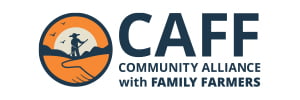Labor and Immigration: CAFF is developing an approach to immigration reform that is market-based and seeks to benefit both family farmers and farm workers.
Climate Change Policy at CAFF: CAFF is a founding member of the California Climate and Agriculture Network (CalCAN) and conducts its work on climate change through this organization.
Direct Marketing of agricultural products has grown rapidly in California. There are now almost 800 farmers’ markets, over 300 CSAs, and an uncounted number of farm and field stands where consumers can buy directly from farmers.
The Farm Bill was passed in December 2018. You can follow updates on its Farm Bill blog: http://sustainableagriculture.net/category/farm-bill/
Water Policy: California is facing statewide concerns over water quality, groundwater overdraft, drought, and climate change. To adequately prepare for our water future, we must increase our investment in California farmers to further optimize water use.
Cottage Food Policy: Homemade Food Act, allowed for the first time in California the production for sale of certain non-potentially-hazardous foods in home kitchens.
Farmland Conservation Policy: CAFF partnered with the American Farmland Trust and the California Climate and Agriculture Network to jointly sponsor a bill in the California Legislature in 2013 to require the mitigation of the development of farmland.
Compost Policy: CAFF has joined with a number of other organizations to try to harmonize these regulations and make them feasible for on-farm and small-scale commercial composting.
Farm to School: CAFF, in partnership with the Urban and Environmental Policy Institute, co-coordinates the California Farm to School Taskforce. Comprised of practitioners (food service directors, farmers, and advocates) and representatives from state and federal agencies, the Taskforce works across sectors to promote and increase Farm to School programs in California.


